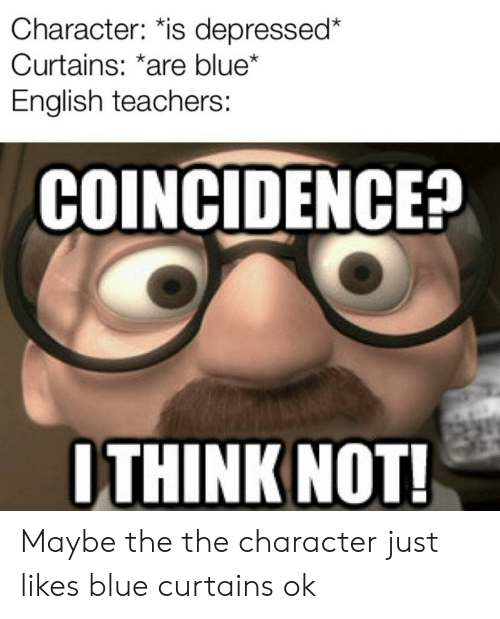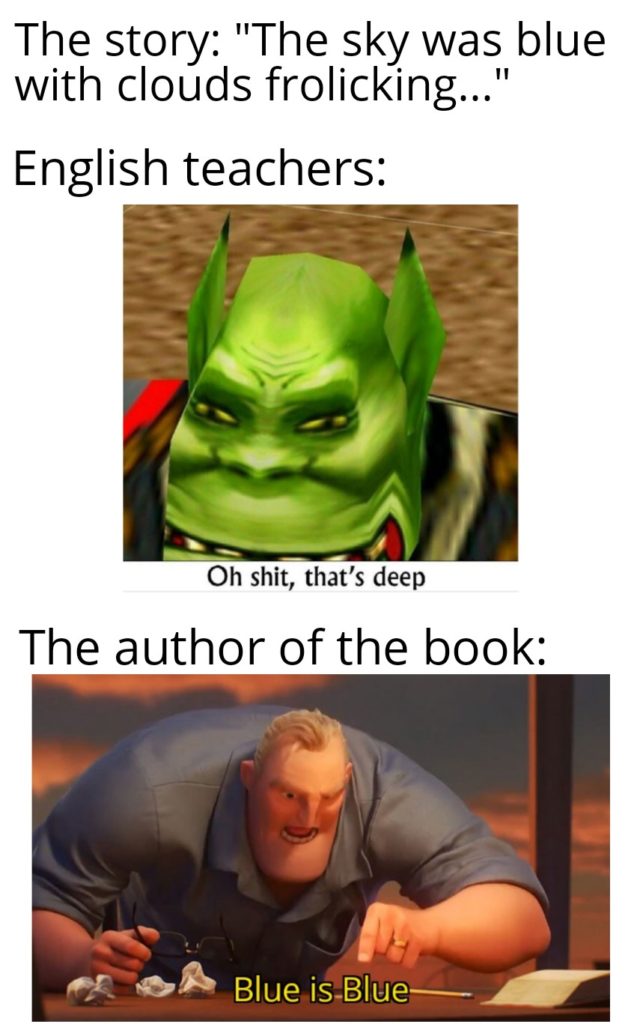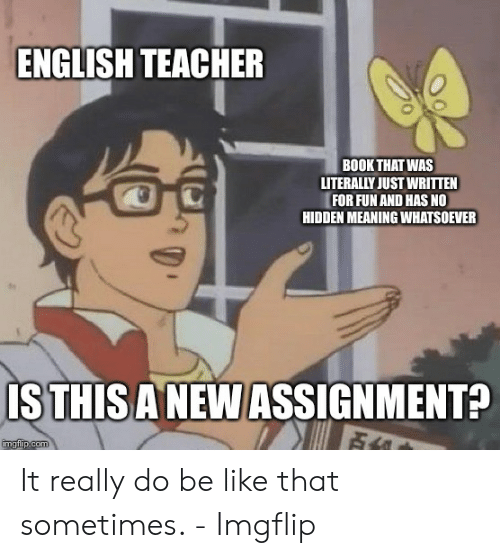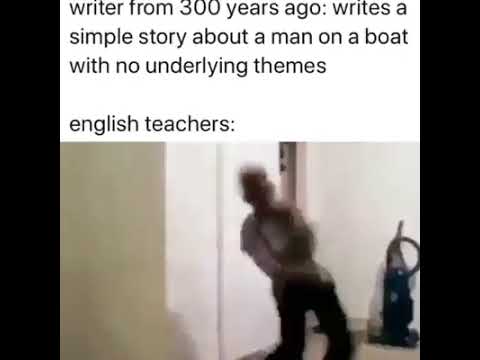I’ve always hated that “curtains are blue” meme. You know the one, or else you can see it in the featured image above. It was a really popular little quote a few years ago. It reached the point where, when people learned of my Writing major, they’d reference the meme to my face! And it still happens occasionally.
And the worst part about it is that the meme is complete garbage.
The Curtains Were Blue Indeed

It’s sort of annoying on its own, just as something reposted endlessly as a sort of sage knowledge. But the fact that it’s blatantly wrong insults the intelligence of every single viewer. Or maybe I’m overestimating things, since so many people regurgitate the “curtains are blue” quote at every turn.
So many people just sort of assume their teachers were idiots. It’s insane!
People really want to take down their high school English teachers, it seems! People had to read books they didn’t like, therefore their teachers were evil. Or idiots. Or something.

Let’s get it out of the way quick: They weren’t. Don’t be an arrogant jerk because you got a C in 10th grade.
It’s not like literary analysis in high school is super in-depth. Students study various books, short stories, poems, essays, etc. and learn about literary devices, rhetorical tools, and writing style. All super basic stuff, but fundamental to being a working adult in the modern world. But due to a weird confluence of Dunning-Kruger effect, vague anti-establishment sentiment, and anti-arts propaganda, we get the assumption that everything we learned in English class was worthless filler, and “curtains were blue” is the epitome of that mood.
No, the “curtains were blue” is NOT some meaningless description. If it ever really appeared in a story taught in class, then in all likelihood it really does mean something.
If you, dear reader, agree with the meme’s opinion, and are still reading this rambling post, then let me hand you three reasons to obliterate this “curtains were blue is meaningless” argument. Stick with me and hear me out.
Reason 1: Why Even Include “The Curtains Were Blue”?

Really, the simplest question is, why is this detail in a story or poem if it DOESN’T mean anything? It absolutely should be relevant in some way, or it should be cut. Maybe it’s symbolic for the characters. Maybe it’s evoking the mood of a location to help paint a portrait. Or maybe it’s a Chekov’s Gun to set up for something later.
Out of context, it’s impossible to say. But, in most cases, if the line is meaningless, then it’s just pointless filler. Something an editor should have cut, and probably did.
Let’s paint a little picture here. Imagine we’re reading some story about, I don’t know, an old English widow living out her last days in the countryside as the robot apocalypse begins. Who cares, it’s a plot. The book goes into a description of the character and spends a paragraph talking about the quaint clothes she wears, too big for her shrinking body and twenty years out of date. a “curtains were blue” moment. Guess what? It’s not there on accident! It’s there to characterize our old lady protagonist, to give a valuable detail for the rest of the story.
If the story describes something with specific detail, it’s probably for a reason.

Of course, there’s lots of middling and bad stories that fill their pages with droning purple prose, where descriptions just exist to make the story longer. But that’s not the kind of stuff you actually read in high school! You don’t read Harlequin romances or isekai LitRPGs, and you don’t read postmodern absurdist anti-narratives either, for that matter. Sadly, nobody gets assigned My Immortal in high school.
You’re reading the classics, the widely popular, famously good, easy-to-teach stuff. Things that help students understand the basics of writing, rhetoric, and criticism. Whatever the teacher is making you read, rest assured it’s probably pretty transparent about symbolism and all that.
And along those lines, there’s another very important note to consider:
Reason 2: You’re Probably Not Reading Huge Stuff.
Don’t pretend you read dozens of huge, droning novels in high school. Yeah, in the really long stuff, maybe there’s a few “curtains were blue” moments that really don’t add anything to the story. But that’s not what high schoolers really study.
No, high schoolers generally study short stories, poems, and plays. The stuff that can be assigned on Friday, then discussed on Monday morning. The stuff where style, theme, and rhetoric are glaringly obvious.

Maybe some schools do assign 700 page Russian epics. But my experience in high school and observing other classes is that novels rank pretty low when doing literary analysis. There’s a good reason for this; novels are long, and everything else is short! You can read maybe 3 books in a semester, given how slow classes have to move to accommodate for the procrastinators. You can read many more short works in that same time.
In short work, obviously, every detail REALLY DOES matter. Every single scene in a play is relevant. Every paragraph in a short story contributes. And most of all, every single word in a poem is vital.
This is the main priority for most English classes, and if a “curtains were blue” line shows up in these, you best be certain it’s not just gloss.
Especially short stories. Man, don’t get me started on how dense the details are in some of the short stories you read in high school.

And the third reason is that “we hate art majors” point, but valid nonetheless:
Reason 3: You Can Analyze Literature. It’s OK.
Literary analysis is all about finding a thesis and arguing it. Examining works based on a certain lens and piecing that apart with research or rhetoric.
The author’s intention doesn’t always matter. In some lenses, it sure does. But in others, you can ignore it freely; that’s what Death of the Author is all about. If the author intended for the curtains to symbolize the sentiment of Irish Independence, great. If they didn’t, and you can still argue it anyway, that’s great too.
Anti-arts people love to lambast criticism without realizing they use it every single day. Different interpretations of song lyrics, acquiring nuance out of a political speech, stupid fan theories for old cartoons… Literary analysis with many lenses is everywhere.
If you don’t think the curtains mean anything in this hypothetical story, then make your case for why not. Use your skills to analyze the text and be a part of the conversation.
That’s part of what makes literature so interesting; it’s not just one hidden secret ending to unlock. There’s many paths to understanding a work.
Your teacher may not have let the class formulate their own opinions, but if so, that’s a failure of the public education system more than anything; sometimes teachers don’t have enough time to fit that kind of stuff into the jam-packed semester. It’s a hell of a lot easier to teach one standard, commonly accepted viewpoint, and hope people learn better in university. But I imagine most English teachers did a better job than we realize.
Stupid Final Addendum

As you’ve probably noticed, almost all of the memes I’ve shared have this bizarre little detail: The assumption that the author didn’t or doesn’t have any opinion on the work that the teacher is sharing. In these memes, the author themself is the one refuting the teacher.
That’s complete bullshit. What real-life examples can anyone cite about this? What authors have talked about some passage of their work, especially short stories, and said, “Nah, this is completely meaningless?” And if those authors exist, what percent of those were just playing coy?
Give five seconds to think about it, and the whole thing falls apart.
Concluding the Curtains
There. The curtains were blue and it wasn’t just a throwaway line. Probably. I still have no idea what story the line came from. Maybe it wasn’t even from a story. Who knows?
I really wanted to rant about this. For some reason, I doubt anyone will ever bother to read it if they disagree with me, and everyone who makes it this far was already on the same train. That’s the internet for you though. But if I did make an impression here on anyone, please let me know. Especially if you still disagree. Unlike what social media teaches, disagreeing about things is perfectly OK in many cases! It’s not evil! And it doesn’t have to become a “discourse” either.
Anyway, that’s all. This was way too long.
Are you a young writer? Check out my “Advice to Teen Writers” post. And, if you’re looking for places to post your stories, check out my Web Fiction Website Directory.




Reading this post made my 12th-grade self, and even my current self, upset. I will explain.
Keep in mind that I DIDN’T know there was such a thing as Curtains Are Blue memes. I didn’t even encounter similar ones, especially not in high school. So when I was reading things like The Great Gatsby and NOT actually talking about them with my friends, I felt like I was the only one around who didn’t like them whatsoever and who found what was “pregnant with meaning” unexciting or even unintentional. I felt pretty alone in saying, “Maybe the author just felt like adding that detail, and you can never argue that that’s NOT true.” Looking back, I think I’d always suggest that first and foremost because that’s what I would’ve done — thrown in details like blue curtains because I felt like it. Because I was a darned high schooler with little experience and I hated “symbolism that was too much of a stretch,” which is obviously subjective, and beyond that it’s so hard to define that maybe it can’t and shan’t be defined at all!
Actually, my favorite high school book as a high schooler, that I found most approachable, that I would always write essays about in record time, was Native Son, in large part because the symbolism is SO dead obvious that even I, EVEN I, knew that every detail that wasn’t just a touch of scene-setting to put you in the moment was intended to have a deeper sociological meaning. I felt that it gave me zero opportunities to say to myself “what could this possibly mean?” because the narrator literally tells you what the narrator thinks it means time after time in the book.
Maybe a better way to put this is, I hated it when author intent wasn’t obvious. (Which is really me saying that I hate it when I can’t GUESS author intent that I PERCEIVE as obvious.) Even today, it can be very very hard for me to approach work where I feel I have no grasp of intent.
“If it ever really appeared in a story taught in class, then in all likelihood it really does mean something” — THIS is what I wish my twelfth-grade self had been told.
People should teach Death of the Author-style thinking in school more.
Death of the Author, and analyzing literature (and other work!) through multiple lenses, is a very important skill that should be taught in all high schools. Unfortunately, high schools are sort of struggling just to teach rhetoric, as we can see in real life every day with how many people fall for populist strongmen and conspiracy theories. A level beyond just basic literary devices is too much to ask for at many schools… And I hope that changes.